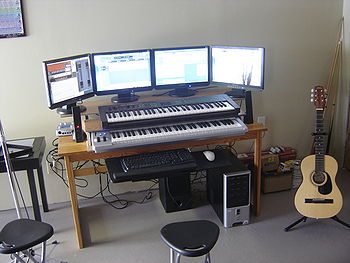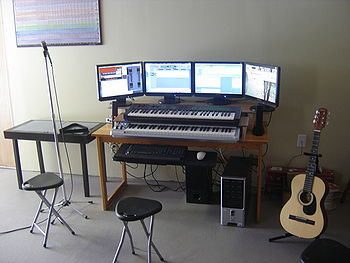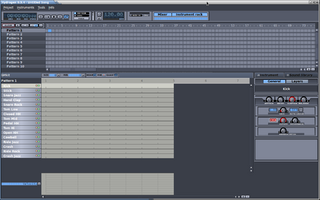Example of Building a Recording Studio
Here is the newer configuration of my Ubuntu Home Recording Studio. Notice the add-on to the left of the recording studio for a stop-motion photography section for my son. He likes to make videos with Lego figures and post to YouTube. The music studio is close by in order to generate our own music thereby not breaking any copyright laws when posting up Videos containing music to YouTube. This is the second phase to learn how to operate the equipment, and start planning for final hardware configuration (Estimated Completion Date: October 2010)...
Contents
Here are some considerations for my studio setup:
(Based on years of "playing around" with audio/midi equipment during my younger years)
- No table!, I want to build a "tube frame" setup for the keyboards, CPU, to have minimal presence. I want to mount the 4 monitors on a tube structure that is curved to provide a concave appearance to make it easier for the user to view. I don't want to use an A Tubular frame which would push the keyboards away from the wall. By the way, this will be done in a most cost-effective way (i.e. save money!).
- Hide the cables!, Advertisements for music equipment never show the cables! Correct permanent placement of cables (to hide them) is an exercise in patience, and I'm glad I know someone that will do this for me!
- Remove bases for 4 monitors and connect them to the wall (via a concave-shaped tube structure).
- Best placement of Tascam US-122 device to connect guitar, vocals.
- Lift Computer (CPU) off ground to make it easier to insert USB key.
- Placement (stack) of 2-3 keyboards to allow ease of use, yet allow access to MIDI controllers.
- Placement of Computer Keyboard / Mouse for smooth operation.
- Use Adjustable Drop-down lighting with dimmer switch above studio to help set mood for recording session.
- Add posters and Keyboard / Guitar charts to provide attractive yet functional display of home recording studio
Here are examples of the types of posters:
[keyboard Chart] [Guitar Chart]. I already had the keyboard chart for many, many years, but want to get the matching guitar chart. I like these types of charts since they are both decorative and functional... By the way, I'm not trying to sell these products, I just like them so I'm providing a link for reference...
I will also include a few our my band's gig posters to set the mood as well...
Here is a close-up of my 3 monitor display, and the applications running in each screen:
Left-side: Hydrogen Drum Machine
Middle: Ardour DAW (Digital Audio Workstation), Qsynth keyboard
Right-side: Ardour Device Mixer, Jack server control, Bristol organs (Hammond B3, Vox Continental, Rhodes Piano)
Note: Click on image below, and then click on the image again to see close-up!
Status (as of December 2010):
- Music studio system setup is fully operational... Starting to practice techniques for playing mutliple keyboards.
- Have 4 monitor system using X-windows. This is very useful to have various applications launch in different windows to make it easier to use.
<br /I had to "tweak" the BIOS to actually boot up with the PCI Nvidia card instead of the ATI card. Seems silly, but in this way, the configuration works. I purchased a dual DVI/VGA PCI card (expansion slots rather limited on my machine), so I can expand to 4 monitors...
Here is a link to my current status of a 4-monitor setup: Four Monitor X-Windows - Have written a partially completed shell script which is run upon system startup to automatically start Jack server, launch music applications, and automatically make patch connections to jack. The current applications that I use are: Jack, Qsynth (Sound Bank, including grand piano), Hydrogen (Drum Machine), Bristol Organ (Hammond B3, Continental Vox (i.e. Doors), and Rhodes Piano), Ardour DAW (Digial Audio Workstation).
Here is a link to my partially completed shell script: [ txt ]
Outstanding Tasks (Computer System Setup):
- Use LVM to span storage space over 3-4 hard disk drives.
- When I have time, create a shell script to terminate studio applications. I like having a script to automatically launch and patch studio applications, but find it tedious to close applications - this should be automated...
- Determine method to support keyboards from the wall - Tubular Structure
- Attach monitors to the wall, monitors to curve (in a concave fashion).
- Purchase additional Midi Keyboard / Controllers (88 key fully weighted keyboard, and a 60 key semi-weighted keyboard). DONE, but pending delivery of 88 key midi controller in mid January 2011. I already have an old Yamaha DX27 keyboard...
By the way, don't let a music store sales rep talk you into purchasing a keyboard for $2500 to $3000. If you are going to use Ubuntu Studio and its applications to generate sound, all you need is a Music/Midi Controller Keyboard. The keyboard itself does not produce the sounds, but sends important MIDI data which connects to the computer system (desktop, or notebook for live performances). A fully weighted 88 key midi controller should only cost around $300 - $400 CDN, and a 60 semi-weighted midi controller keyboard should cost between $150 - $200 CDN... - Start having fun (I already am having fun) !!!
Presentation at FSOSS 2012
- Experimenting with Kiosk
- Screen capture (4 monitors - ogg vorbis video): ogv



